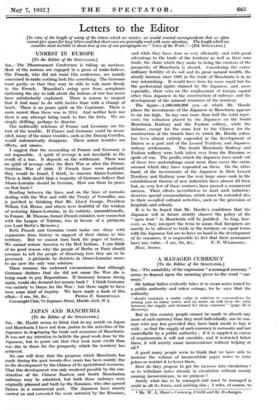JAPAN AND MANCHURIA
[To the Editor of the Spacrsrort..] Sin,--Mr. Hardie seems to think that in my article on Japan and Manchuria I have not done justice to the activities of the Japanese in developing the trade and resources of Manchuria. It was not my intention to belittle the good work done by the Japanese, but to point out that they took more credit than was due to them for the prosperity which the territory has achieved.
No one will deny that the progress -which Manchuria has made during the past twenty-five-years has been mainly due to the development by the Chinese of its agricultural resources. That this development was only rendered possible by the con- struction of the Chinese Eastern and South Manchurian railways may- be admitted, but both these railways were originally planned and built by the Russians, who also opened Dairen as a commercial port. The Japanese have merely carried on and extended the work initiated by the Russians,
and while they have done so very efficiently, and with great advantage to the trade of the territory as well as their own trade, the claim which they make to being the creators of the prosperity of Manchuria is absurd. Considering the extra- ordinary fertility of its soil and its great natural wealth, the steady increase since 1907 in the trade of Manchuria is in no way astonishing. It would have been far more rapid but for the preferential rights claimed by the Japanese, and, mon- especially, their veto on the employment of foreign capital other than Japanese in the construction of railways and the development of the mineral resources of the territory.
The figure-1,500,000,000 yen—at which Mr. Hardk• places the investments of the Japanese in Manchuria appears to me too high. In any case more than half the total repre- sents the valuation placed by the Japanese on the South Manchuria Railway and the Fushun colliery, while the balance, except for the sums lent to the Chinese for the construction of the branch lines to which Mr. Hardie refers. has been almost entirely expended in the development of Dairen as a port and of the Leased Territory and Japanese
railway settlements. The South Manchuria Railway and Fushun colliery were both taken over from the Russians as spoils of war. The profits which the Japanese have made out of these two undertakings must more than cover the entire amount which they have expended on them. On the other hand, of the investments of the Japanese in their Leased Territory and Railway zone the very large sums sunk in the establishment therein of new industries have almost all been lost, as very few of these ventures have proved is commercial success. Their efforts nevertheless to start such industries deserves special commendation, which must be extended also to their so-called cultural activities, such as the provision of hospitals and schools.
It is to be hoped that Mr. Hardie's confidence that the Japanese will in future strictly observe the policy of the " open door " its Manchuria will be justified. As long, how- ever, as they interpret the term to mean that foreigners are merely to be allowed to trade in the territory on equal teats with the Japanese but are to have no hand in the development of its resources, it is impossible to feel that their assurances
have any value.—I am, Sir, &c., F. E. WILKINSON. Hove, Sussex.






































 Previous page
Previous page